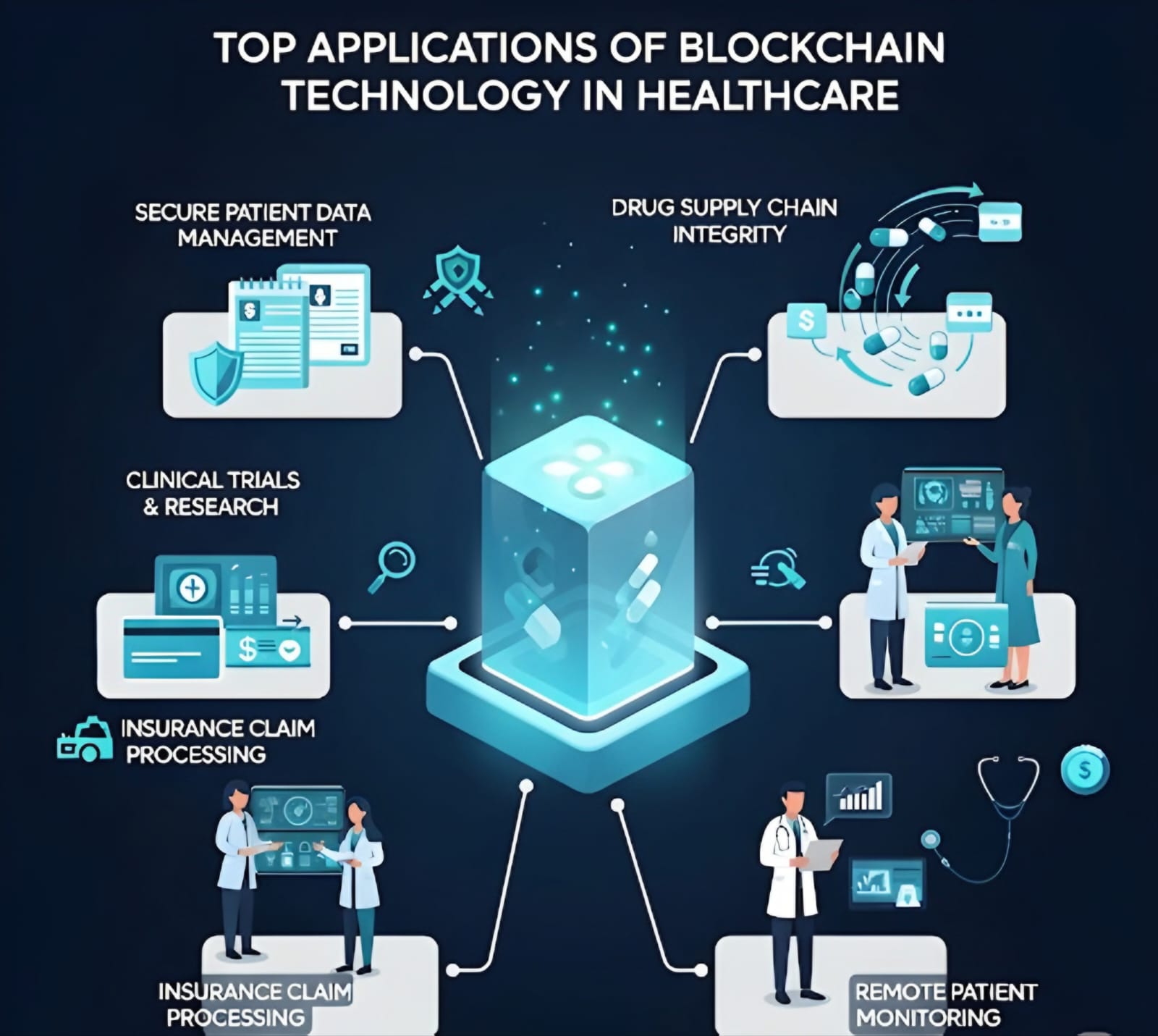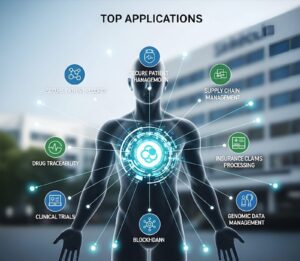
Contents
- 1 10 Top Applications of Blockchain Technology in Healthcare
- 1.1 1. Safe Digital Well being Data (EHRs)
- 1.2 2. Drug Provide Chain Transparency
- 1.3 3. Medical Trials and Analysis Integrity
- 1.4 4. Affected person-Centric Knowledge Possession
- 1.5 5. Fraud Prevention in Billing and Insurance coverage
- 1.6 6. Provide Chain Administration of Medical Units
- 1.7 7. Distant Affected person Monitoring and Telemedicine
- 1.8 8. Medical Credentialing and Licensing
- 1.9 9. Public Well being Surveillance and Pandemic Response
- 1.10 10. Medical Donations and Humanitarian Assist Monitoring
- 1.11 (FAQs)
10 Top Applications of Blockchain Technology in Healthcare
Blockchain know-how is revolutionizing a number of industries, and healthcare is among the most promising fields for its software. The decentralized, clear, and immutable nature of blockchain makes it ideally suited for addressing long-standing issues in healthcare, equivalent to knowledge fragmentation, lack of transparency, safety points, and inefficiencies in affected person care. On this article, we discover the highest 10 real-world purposes of blockchain know-how in healthcare, offering an in depth take a look at how this innovation is reshaping the {industry}.

1. Safe Digital Well being Data (EHRs)
Digital Well being Data (EHRs) are the digital spine of recent healthcare. Nevertheless, knowledge breaches, unauthorized entry, and lack of interoperability proceed to plague the system. Blockchain gives a safe and tamper-proof solution to retailer and share EHRs. By encrypting affected person knowledge and distributing it throughout a decentralized community, blockchain ensures that information are accessible solely to licensed events. Sufferers can management who accesses their well being knowledge, selling transparency and belief. Moreover, blockchain can improve knowledge interoperability between completely different hospitals and healthcare suppliers, bettering coordinated care and lowering administrative burdens.
2. Drug Provide Chain Transparency
Counterfeit drugs are a world difficulty, costing billions and risking lives. Blockchain introduces unparalleled transparency to the pharmaceutical supply chain by facilitating comprehensive traceability. Each transaction—from manufacturing to distribution to allotting—will be recorded on a blockchain ledger, making it straightforward to confirm the authenticity of medicine. Sufferers and pharmacists can scan a product’s QR code to hint its total journey, guaranteeing it’s real. This functionality not solely prevents counterfeit medication but in addition helps in monitoring product recollects and expiry dates, considerably bettering affected person security and regulatory compliance.
3. Medical Trials and Analysis Integrity
Medical trials are important for creating new therapies, however knowledge manipulation and lack of transparency can compromise their validity. Blockchain ensures knowledge integrity by recording each trial exercise on a tamper-proof ledger. From participant consent to check outcomes and amendments, every step is logged immutably. Researchers, regulators, and sponsors can entry real-time updates, bettering belief within the outcomes. Furthermore, affected person knowledge will be anonymized and shared securely for secondary analysis with out compromising privateness, accelerating innovation in drug growth and medical practices.
4. Affected person-Centric Knowledge Possession
Probably the most transformative impacts of blockchain is shifting knowledge possession to sufferers. Historically, healthcare suppliers management affected person information, limiting affected person entry. Blockchain permits people to personal and handle their medical knowledge by way of safe digital identities and sensible contracts. Sufferers can grant or revoke entry to particular knowledge factors, permitting extra personalised and participatory healthcare. This empowerment can improve affected person engagement, enhance well being outcomes, and allow seamless knowledge sharing throughout completely different healthcare programs and apps.
5. Fraud Prevention in Billing and Insurance coverage
Healthcare fraud prices billions yearly, with false claims, overbilling, and id theft being frequent issues. Blockchain brings transparency and accountability to medical billing and insurance coverage claims. Each transaction, from therapy information to billing statements, will be time-stamped and verified on a shared ledger. Sensible contracts can automate claims processing, guaranteeing funds are made solely when predefined circumstances are met. This not solely reduces fraud but in addition accelerates reimbursements, bettering effectivity for each suppliers and insurers.
6. Provide Chain Administration of Medical Units

Past prescription drugs, blockchain can improve the traceability of medical gadgets. From manufacturing to supply to utilization in hospitals, every stage will be recorded on a blockchain ledger. This visibility helps make sure that gadgets aren’t tampered with, are correctly maintained, and are used as supposed. Hospitals can monitor upkeep schedules, producers can monitor machine efficiency, and regulatory companies can guarantee compliance. This reduces gear failure, will increase affected person security, and streamlines asset administration.
7. Distant Affected person Monitoring and Telemedicine
As telemedicine and distant affected person monitoring turn into mainstream, guaranteeing knowledge safety is essential. Blockchain gives a decentralized platform to document and transmit delicate well being knowledge from wearables, cellular apps, and residential monitoring programs. Sufferers can securely share their knowledge with docs in actual time, permitting for well timed interventions and personalised care. This know-how reduces the danger of knowledge breaches and builds belief between sufferers and suppliers, making distant healthcare more practical and safe.
8. Medical Credentialing and Licensing
Confirming the qualifications of healthcare professionals is a lengthy process and susceptible to fraudulent activities. Blockchain can streamline medical credentialing by making a decentralized registry of verified {qualifications}, licenses, and work historical past. Hospitals and hiring establishments can immediately confirm a health care provider’s credentials, lowering onboarding time and bettering belief. Updates equivalent to license renewals or disciplinary actions will be recorded immutably, guaranteeing transparency and enhancing affected person security.
9. Public Well being Surveillance and Pandemic Response
Blockchain can play a significant function in public well being surveillance by enabling real-time knowledge sharing throughout international locations and establishments. Throughout pandemics, well timed and correct data is essential. Blockchain can document an infection charges, take a look at outcomes, vaccination information, and make contact with tracing knowledge in a safe and privacy-preserving approach. This helps governments and well being organizations reply shortly and coordinate efforts extra successfully. It additionally minimizes the danger of misinformation and knowledge manipulation, enhancing public belief.
10. Medical Donations and Humanitarian Assist Monitoring
In catastrophe zones and humanitarian missions, monitoring donations of medical provides and funds is essential. Blockchain gives a clear system for recording and monitoring support distribution. Donors can see the place their contributions are going, whereas recipients can confirm the origin and amount of obtained provides. This stage of transparency reduces corruption, ensures honest distribution, and builds donor confidence. In disaster conditions, it may well imply the distinction between life and demise.
Read More: Blockchain technology is Applied in Cryptocurrency
(FAQs)
Q1: Is blockchain know-how protected for storing well being knowledge? Sure, blockchain gives sturdy encryption and decentralized storage, making it extremely safe and proof against hacking or unauthorized entry.
Q2: Can sufferers management who sees their medical information with blockchain? Completely. Blockchain permits sufferers to handle knowledge entry by way of personal keys and sensible contracts, giving them full management over who can view their well being data.
Q3: How does blockchain scale back healthcare fraud? Blockchain creates an immutable ledger for all transactions, stopping tampering or duplication, which considerably reduces fraud in billing, insurance coverage, and credentials.
This autumn: Are there any real-world examples of blockchain in healthcare? Sure. Firms like MediLedger, Guardtime, and IBM Watson Well being have deployed blockchain options for provide chains, EHRs, and medical trials.
Q5: What are the challenges in implementing blockchain in healthcare? Challenges embody regulatory hurdles, excessive implementation prices, lack of standardization, and the necessity for industry-wide collaboration.
